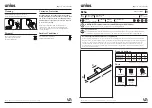
Operating and Assembly Instructions – A.B.S. Flexilo ECO for wood pellets
Extract from accident prevention regulations
Subject to technical change
Issue 09/2016
Page 27 of 32
©A.B.S. Silo- und Förderanlagen GmbH
7
Extract from accident prevention regulations
Agricultural Trade Association for Central and Eastern Germany
OT Hönow Hoppegartener Str. 100 15366 Hoppegarten
§ 1 Principles
These accident prevention guidelines shall apply to storage facilities in which loose
bulk and solid materials shall be stored.
Instruction guidelines
1. Storage facilities include bulk material silos for holding e.g. powdery, grainy or shredded
materials.
§ 2 Set up
The contractor must ensure that
1. Storage facilities are set up such that persons are not endangered by operation in
accordance with their intended purpose and that injured parties can be rescued,
2. Control stations for silos, under which vehicles shall drive, are positioned outside of
the traffic access area,
3. Pneumatic connection points for the storage facilities to be filled are at an easily
accessible height,
4. Filling, control and removal openings, filling and removal fittings and extraction
valves are arranged and
designed such that
− Insured parties can operate these without risk
− Insured parties will not be injured by the storage material while it is being filled into
the storage facility
− The material to be stored can be filled and removed without any disruption
− Electro-static charge cannot build up,
5. Silos made of UV-light-sensitive materials shall be positioned such that they are
protected from UV radiation,
6. Suitable fittings are attached on storage facilities intended for the use of additional
operational facilities for their installation and removal,
7. The storage capacity and permissible filling weight are specified on bulk material
silos,
8. The access height is clearly visible on storage facilities under which vehicles can
drive,
Instruction guidelines re item 1
1. If storage facilities are set up as part of self-build work, a specialist such as an architect or
master bricklayer should confirm that the building and foundations are suitable for
accommodating a silo and the associated loads.
As a rule, this is required for silos,
− that are not self-supporting,
− for which a statically analyzed supporting structure is not supplied,
− that shall be installed on existing foundations or building ceilings,
− that shall be hung from existing building ceilings or in
installed in roofs (sack silos).
Incidentally, please observe the following rules and regulations:
State building regulations
More extensive water management requirements
DIN 1055-6 Assumed loads for buildings; Section 6: Loads in silo cells
DIN EN ISO 14122 Permanent means of access to machinery
DIN 18799 Safety ladders on building facilities
2. Insofar as silos must be climbed into in accordance with its intended operation,
− Openings with an inside width of at least 60 cm
− Access and exit aids, e.g. in the form of safety ladders or step irons are necessary.
3. To rescue casualties from silos, in which life-threatening vapours can develop, it is
necessary to include measures such as accessing the silo wearing breathing apparatus and
hoist rings for attaching a rescue rope.
4. Additional hazards may arise e.g.
− during the pneumatic filling due to connection lines breaking or leaking, or due to the
unintentional opening of the hose couplings; the connection pieces must be arranged such
that the hose connection are as short as possible to the container vehicle.
Instruction guidelines re item 6
1. Additional operating facilities can include blower pipes, removal/distribution equipment and
access fixtures.
2. Suitable facilities for the safe installation and removal can include lifting and hauling fixtures
and swivelling jib.
§ 3 Climbing equipment
The contractor must ensure that
1. Storage facilities, whose upper edges are more than 1 m above the floor and must be
mounted for regular operational work, must be equipped with secure climbing
equipment
Instruction guidelines re item 1
The requirement is regarded as fulfilled for silos, when e.g. stairs with railings are attached on
the free sides or safety ladders are attached. Apart from that, Paragraphs 7 and 8 of the
accident prevention guidelines "Workplaces, building sites and facilities" (VSG 2.1) must be
observed.
§ 5 Protection from falling
The contractor must ensure that
1. Storage facilities must protected from persons falling in, in the event of the fall height
being greater than 1 m,
2. Storage facilities in a traffic area with an upper edge at floor level must be protected
from vehicles accidentally falling in,
3. Storage facilities that can be accessed at the height of the upper edge must be
secured again persons falling in, if the upper edge is higher than 1 m above the ground,
Instruction guidelines re item 2
Protection against vehicles falling in can include e.g. 30 cm high approach pedestal.
Instruction guidelines re item 3
1. As protection against person falling in, a parapeted railing 1m to 1.30 m high, knee rails at
30 cm to 50 cm and a 5 cm high foot bar is adequate. Flexible covers
– such as plastic sheeting and similar are not regarded as adequate protection from persons
falling in.
§ 6 Filling and removal
The contractor must ensure that
1. Silos may only be filled with the material and with the permissible quantity as
specified in the user guide.
§ 7 Access and saving casualties
The contractor must ensure that
1. Only persons aware of the associated risks may access the silo
2. The necessary aids to secure people accessing the silo are kept available in
proximity of the access area and the insured persons are familiar with the usage of said
aids
3. That silo is not accessed during the mechanical emptying process or emptying due
to gravity.
(2) Before and during any access time in the silo, it must be ensured that
− no suffocation or poisoning hazard will arise
− adequate air is available
− Operational facilities are reliably protected from being activated.
Instruction guidelines
5. A lockable main switch is an example of providing reliable protection against accidental
activation of the operational facilities. Operational facilities in this sense are removal and
distribution equipment.
(3) It is only permissible to access bulk material silos, when the person accessing is
roped up and the rope is secured outside of the silo and said person is secured by two
persons.
(4) Access to recover casualties is only permitted when the person accessing the silo is
secured such that, he/she can leave the danger at any time and suitable aids for
ensuring air to breather are used.
(5) In the event of nausea, the storage facility must be left immediately.
§ 8 Installation and removal of additional operational facilities The contractor must
ensure that suitable equipment is available and used for the installation and removal of
additional operational facilities.
Instruction guidelines
Please observe § 2, Item 6.
§ 10 Warning signs
The contractor must ensure that a warning sign indicating the type of risks is attached
at a clearly visible point on storage facilities in which dangerous gases or dusts can
build up. This is also valid for removal stations in buildings.
Instruction guidelines
§ 11 Monitoring bulk material silos
The contractor must ensure that bulk material silos are regularly examined as follows
− The silo walls to ensure these are sealed and have no tears or pitting corrosion,
− The load-bearing construction and layers for deformation or displacement of the
brackets,
− On sack silos: the load-bearing frame, the suspension system, the seams
and UV light protection features.
Abridgement of UVV
LagerstättenVSG 2.2
vom 1. Januar 2000
Stand 14. Dezember 2007






































